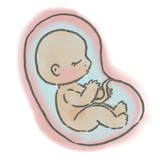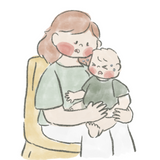How Non-Nutritive Sucking Helps Babies Sleep Better
An infant's sucking instinct develops as early as 15 weeks into pregnancy and continues after birth, primarily as a cue for hunger and feeding. However, babies also engage in non-nutritive sucking (NNS) — sucking on fingers or other objects even when they are not hungry. This behaviour is more than just a reflex; it plays a crucial role in an infant's development and well-being.
Non-nutritive sucking typically happens in situations such as:
• When babies suck on their thumb, hand, fingers, or pacifier
• At the beginning of breastfeeding before milk letdown
• At the end of a feeding session
• On an empty breast
• On a caregiver’s clean finger
NNS usually occurs at a rate of about two sucks per second, in bursts of six to eight sucks at a time. It is especially important for preterm or ill infants, as it helps them develop the sucking skills needed to transition to full milk feeds.
How Does NNS Help Babies Sleep Better?
1. Sensory Stimulation
Newborns naturally bring their hands to their mouths - not always as a hunger cue, but as part of exploratory behaviour. This action allows them to experience their surroundings through touch and movement, supporting cognitive development in the sensorimotor stage (birth to 2 years).
When babies find comfort in self-touching actions, such as finger-sucking, they attempt to repeat the behaviour, gradually establishing self-settling or self-soothing habits. Studies show that this process has a calming effect, helping babies sleep longer and more soundly.
2. State Regulation
NNS plays a key role in helping infants regulate their behavioural and physiological states, a process known as state regulation. It supports babies in achieving and maintaining a quiet alert state, which is essential for feeding, learning, and interacting with their environment. This calming effect helps babies transition smoothly between states—such as from sleep to wakefulness or distress to calmness—and reduces restlessness or agitation. As a result, babies conserve energy and focus on growth and development.
For preterm infants in neonatal intensive care units, NNS has additional benefits, such as lowering stress levels and reducing distress during medical procedures. By promoting self-soothing and physiological stability, NNS significantly contributes to an infant’s overall well-being and developmental progress.
How to Support NNS in Your Baby?
Encouraging self-soothing through NNS early on can help your baby settle faster and sleep longer. A simple way to support this is by allowing your baby to bring their hands to their face and mouth while swaddled.
That’s where the Fetal Flex Swaddle comes in! Designed in Australia, its patented Fetal Flex design helps your baby self-soothe, settle faster, and transition smoothly to sleep.
NNS plays a crucial role in infant development, offering numerous sleep, health, and developmental benefits. In this video, we focused on how it helps babies self-soothe, relax, and sleep better. We’ll explore even more benefits in upcoming videos—so stay tuned!


 New Zealand Dollar (NZD)
New Zealand Dollar (NZD)
 Hong Kong Dollar (HKD)
Hong Kong Dollar (HKD)
 Japanese Yen (JPY)
Japanese Yen (JPY)
 Singapore Dollar (SGD)
Singapore Dollar (SGD)
 South Korean Won (KRW)
South Korean Won (KRW)
 United Arab Emirates Dirham (AED)
United Arab Emirates Dirham (AED)
 Canadian Dollar (CAD)
Canadian Dollar (CAD)
 British Pound (GBP)
British Pound (GBP)
 Euro (EUR)
Euro (EUR)
 Swiss Franc (CHF)
Swiss Franc (CHF)
 Swedish krona (SEK)
Swedish krona (SEK)







